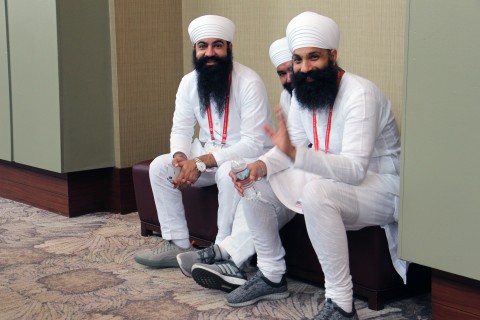Global Hindu gathering sparks debate over pride in religious identity
“I didn’t come here to find an echo chamber,” one attendee said.

The World Hindu Congress gathered 2,500 people from 60 countries in Lombard, Illinois, marking a historic event in global Hinduism while facing a dispute about the intersection of the religion and politics today.
In September 125 years ago, Swami Vivekananda gave a speech to the World’s Parliament of Religions in Chicago, saying he was proud to belong to a “religion which has taught the world both tolerance and universal acceptance.”
That speech “put Hinduism on the global map,” said Nitika Sharma, spokeswoman for the Lombard event, organized by the World Hindu Foundation.
Abhaya Asthana, president of Vishwa Hindu Parishad of America and coordinator of the 2018 congress, said the speech “paved the way for Hindus to carry their traditions and values with confidence and pride as they traveled and settled in different corners of the world.”
This was the second global congress, the first having taken place four years ago in India and the next one planned for 2022 in Bangkok.
To critics, some speakers and groups at the gathering—including VHPA—crossed a line from pride into Hindu nationalism or Hindu supremacy, said Sunita Viswanath, cofounder of Sadhana, a group of progressive Hindus.
“A gathering like the World Hindu Congress seems to be celebrating Hinduism and India at a time when we think what’s urgent is speaking out for peace and nonviolence,” she said.
Sadhana joined other South Asian, Hindu, Dalit, Muslim, and activist organizations in a coalition that held a news conference prior to the congress, charging some participating organizations as “worsening the human rights situation in India.”
Read our latest issue or browse back issues.
The Coalition for the Defense of the Constitution and Democracy said in a statement that its goal was to highlight the persecution of minorities, attacks on constitutional rights such as freedom of the press, and “the nexus of right wing political forces in India and the United States around the common cause of promoting Islamophobia and violent majoritarianism.”
Another organization the coalition objected to was Rashtriya Swayamsevak Sangh. RSS has been called “an ideological, nationalist Hindu group” by Reuters news agency. Its members hold key government positions after helping Indian prime minister Narendra Modi rise to power in 2014.
After Modi’s first two years in leadership, Philip Jenkins wrote in the Christian Century of the rising dangers to Christians and Muslims in India. The victory of Modi’s Bharatiya Janata Party “sparked an alarming escalation of extremist rhetoric and activism” especially related the notion that Islam and Christianity are non-Indian religions that must be rejected.
At the World Hindu Congress, several people were arrested at a panel discussion on collective efforts for Hindu resurgence that included Mohan Bhagwat, the head of RSS. Chicago South Asians for Justice said in a statement that they had staged a “peaceful disruption” and that congress attendees “choked, kicked, and spat on us.” A video posted online showed people surrounding and shouting over protesters holding up a banner.
Congress spokeswoman Sharma said the goal of “creating a proud Hindu identity” does not make RSS or the congress nationalist.
“I don’t think it is the correct way to describe us,” she said.
Sharma highlighted that diversity of thought is “one of the core values of Hindu dharma,” or teaching, which includes a number of schools that can be contradictory but still are united in their fundamental beliefs.
“We do believe that everyone should be free to choose what they believe in,” she said. “Just like we’re proud to do this, if someone feels strongly against it, they’re free to express their views.”
Panelists in a session on cultivating political leadership in the United States and other Western democracies said that sponsors and speakers had received petitions asking them to withdraw from the event. U.S. Rep. Tulsi Gabbard of Hawaii, the first Hindu elected to Congress, excused herself months ago, citing “ethical reasons arising from participating in partisan politics of India in America,” according to news reports.
Gabbard’s office did not return a call for comment, and organizers did not immediately answer questions on how many panelists or sponsors had dropped out.
Vindhya Adapa, 28, a Hindu American attorney for HIAS, a refugee resettlement agency, in Washington, D.C., said she was “very, very vaguely” aware of the controversy before attending the event.
During the panel on cultivating political leadership, Adapa took the microphone to say she identified with the Democratic Party and to ask how to work together with other Hindus across party lines. She said later that she came to the congress “to learn more about my faith and learn more about service opportunities, political opportunities, and network with people.”
“At the end of the day, this is a very diverse conference,” she said. “I’m not going to agree with everyone who’s here, and I didn’t come here to find an echo chamber, so, yes, there may be certain politicians or certain leaders that not everyone agrees with, and perhaps that could be one reason why people thought it safe to avoid this conference. For me, personally speaking, this is an opportunity and a place to foster collaborative Hindu identity and thinking.” —Religion News Service; Christian Century staff
A version of this article, which was edited September 25, appears in the print edition under the title “Global Hindu gathering sparks debate over pride in religious identity.’”






